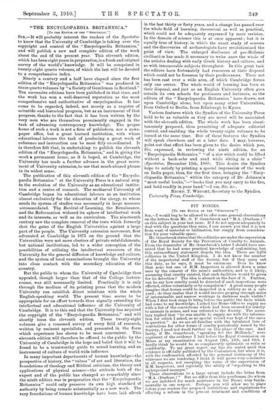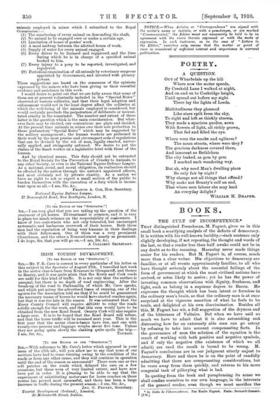PIT PONIES.
[To THE EDITOR Or THE "SPECTATOR."]
would beg to be allowed to offer some general observations on the letters from Mr. 0. F. Grazebrook and "M.A. (Durham.) " on this subject in your last issue. If I do not appear adequately to deal with the questions they raise, I can assure you that it is not from want of material or inclination, but simply from considera- tion for your valuable space.
Mr. Grazebrook states that the collieries are under the supervision of the Royal Society for the Prevention of Cruelty to Animals. From the remainder of Mr. Gmzebrook's letter I should have sur- mised that he had some practical knowledge of coal-mining, but this extraordinary statement dispels the idea. There are 3,276 collieries in the United Kingdom. I do not know the number of the inspectorial staff of the Society, but if they carry out this duty, as he says, it must be enormous. Does he know that none but one of H.M. Inspectors is allowed down a mine save by the consent of the mine's authorities, and is it likely, assuming that cruelty existed, that such facilities would be given for its detection ? The idea is absurd on the face of it. Further, can he say how cruelty could be detected if such inspections were effected, either voluntarily or by compulsion ? A great many people imagine that horses could be inspected in a colliery as in a cab- yard ; do they realise that it would involve groping through miles of interminable and narrow workings in darkness made visible ? When I first took steps to bring before the public the facts which had come to my knowledge, I asked the Home Office to supply me with a list of the convictions which had been secured for cruelty to animals in mines, and was referred to the Society. The secre- tary replied that "he was unable to supply me with the informa- tion for which I asked, as no special record was kept of the cases in question." As we are all familiar with the tabulated lists of convictions for other forms of cruelty periodically issued by the Society, I need not dwell further on this phase of the case. And lastly, if Mr. Grazebrook, "speaking for the Midlands," were cognisant of the evidence I laid before the Royal Commission on Mines at my examination on August 12th, 13th, and 19th, I hardly think he would be so complacently optimistic or write so confidently. To my great regret, my lips are sealed until this evidence is officially published by the Commission, but when it is, with the confirmation afforded by the personal testimony of the witnesses we are tendering, I think it will prove very conclusive in all respects, not excepting the value of the supervision of H.M. Inspectors, and especially the utility of "reporting to the underground manager." These observations to a large extent include the letter from "MA. (Durham.) " But we differ front this gentleman (to whom we are indebted for much assistance in the Press) very funda- mentally in one respect. Perhaps you will allow me to place before your readers the proposed restrictions and regulations-for effecting a reform in the present treatment and conditions of
animals employed in mines which I submitted to the Royal Contragsien (1) The numbering of every animal on descending the shaft.
(2) No animal to be engaged over or under a certain age. (3) Limitation of hours of ponies' work.
(4) A meal midway between the allotted hours of work.
(5) Supply of water for every animal engaged.
(6) Every driver to be licensed and registered, and the time
during which he is in charge of a specified animal booked to him.
(7) Every injury to a pony to be reported, investigated, and registered. (8) Periodical examination of all animals by veterinary surgeons appointed by Government, and invested with plenary powers.
These suggestions are based on the consensus of the opinions expressed by the miners who have been giving us their essential evidence and assistance in this work.
I would desire to point out that we are fully aware that some of them are at present voluntarily included in the "Special Rules" observed at various collieries, and that their legal adoption and enforcement would not in the least degree affect the collieries at which the well-being of the animals employed is considered, but would certainly preclude the perpetration of deliberate or necessi- tated cruelty in the remainder. The number and extent of these latter is the question which is the main consideration. But what- ever facts may be elicited, our contentions are plain and decided. At the present time animals in mines owe their sole protection to these perfunctory "Special Rules" which may be suggested by the colliery management ; the human workers are protected in their work by the most precise and circumspect code of regulations that can be devised by the wit of man, legally enacted', univer- sally applied, and stringently enforced. We desire to put the claims of the dumb worker on a legislative level with those of the human.
And by identical means. This duty should not be entrusted to the Royal Society for the Prevention of Cruelty to Animals, to any other Society, or even to the National Equine Defence League. As a national, social, and moral obligation, its realisation should be effected by the nation through the nation's appointed officers, and most certainly not by private charity. As a nation we have no right to ask or expect a small section of the public to burden themselves with the execution of a duty which is incum- bent -upon us all.—I am, Sir, &c.,
27 Beaconsfield Road, New Southgate, London, N.











































 Previous page
Previous page